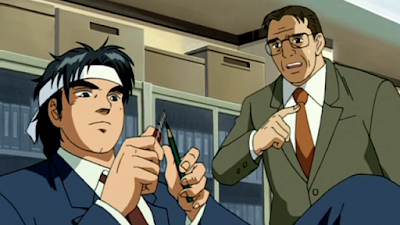 |
| From http://www.anime-planet.com/images/ anime/covers/salaryman-kintaro-1363.jpg |
Director: Tomoharu Katsumata
Screenplay: Chikako Kobayashi and
Sukehiro Tomita
Based on a manga by Hiroshi
Motomiya
Voice Cast: Taisei Miyamoto (as
Yajima Kintaro); Atsuko Tanaka (as Suenaga Misuzu); Masako Katsuki (as Sakurai
Kyoko); Ryoka Yuzuki (as Suenaga Mimi); Katsuhisa Houki (as Kaminaga Hiroshi); Kiyoshi
Kawakubo (as Tomokazu Morinosuke)
Synopsis: The Yamato Construction Company business hires a new salary
man named Yajima Kintaro. To the horror of the staff and upper management, the
man known as Kintaro hired by the company's elderly owner is the former leader
of a giant motorcycle gang who doesn't act like other salary man - he's liable
t talk back at those who he feels are unhonourable even in senior positions and
likely to get into fights if need be. Yet this behaviour also starts to become
a well of inspiration from those around him, rebellion and the desire to become
better employees taking place; even romantic longing from women is to found
alongside the allies in fellow employees, seniors and even yakuza. The widowed
father of a young son, Kintaro is noble, brave and gladly goes out of his way
to help those in need, his reckless powder keg personality likely to scrape
against corrupt management and those who do backstage dealings in the world of
Japanese construction industry.
Salaryman Kintaro is amongst the oddest anime I've covered in terms
of actually being able to see it. It's very normal even by the stereotypes of
anime, a melodramatic drama set in contemporary Japan about the least expected
salaryman possible wanting an ordinary working life. Having seen it it's the
the kind of anime that rarely gets released in the United Kingdom and feels
like what anime actually is for Japanese viewers who aren't obsessive otaku -
mainstream programming like an anime soap opera, not likely to be viewed at two
in the morning like shows that get popular amongst Western anime fans are. Inexplicable
all twenty episodes were released in the UK by the late DVD company Arts Magic in the early days of DVD
alongside obscurer Takashi Miike films,
who would direct a live action film based on Salaryman Kintaro, allowing me to see the absurdly sincere,
coincidence heavy tale of a Mary Sue figure set around the world of the
Japanese construction industry.
 |
| From http://i37.tinypic.com/9tigl4.png |
Based on a manga that was also
adapted into live action television later, Salaryman
Kintaro is a pure masculine fantasy of what the perfect salary man should
be rather than necessarily the reality of the Japanese workplace. This
immediately brings out a charm in the show even if it feels like a retroactive
throwback to older gender politics where men were men, Kintaro the opposite of
someone who has to bow to others and is grinded down by his work, the nostalgic
notion for other characters of when they were younger and more passionate
before the work broke them common in the dialogue. A former punk who saves a
company manager and asks to be hired as a thank you, Kintaro represents to an
extreme the perfect male who will rescue toddlers from a burning nursery and
stand out to corrupt upper management, so perfect in his humanity that his only
flaws are his recklessness and habit of trying to fist fight people to defend
goodness.
 |
| From http://i37.tinypic.com/2wmjnky.png |
Soap opera is the operative word
as the world of Salaryman Kintaro
from the outside, if you cannot engage with its sincerely, can be ridiculous.
Almost every person that encounters Kintaro eventually becomes his ally. Members
of his former motorbike gang, from yakuza to a member who after a significant
event decided he wanted to become a transgender woman, spot him out in the
crowd and those who meet him either fall in love with him if they're women,
such as a rich widowed heiress who becomes one of his main guides, or if
they're male develop crushes like his fellow office workers do. Characters at
points even bemoan how Kintaro is able to weave himself into people's lives
with such complexity, letting the series have some sense of knowingness to its
absurdities. The levels of how many lives Kintaro gets involved with get to the
point of bizarre coincidences, such as a woman he helps when she is molested on
a train turning out to be the fiancée of a yakuza working with a senior underworld
chief who looks to Kintaro with admiration, or Kintaro saving the son of
someone who is on the side of a corrupt company. How convoluted these
descriptions sound is enough to show how elaborate the ties are between
Kintaro, the magnet for everything else, and everyone around him to the point
of the hyper fantastical.
 |
| From http://okanime.com/wp-content/uploads/2014/09/protectedimage.jpg |
The fact that it's all set around
the Japanese construction industry does add an oddness to the show's tone; for
every real concern such as striking workers at a underground tunnel project, or
fantastical ones such as the amount of times Kintaro has to dodge moving
vehicles including a train, it's all set around white collar business at its
most mundane. Even when employees attempt to oust their corrupt boss by hacking
into the finances, that early plot event is dealt with through whether people
are sitting or standing up in a senior staff meeting with elaborate speeches to
cover the fact. While the show heightens the world of the construction industry
with fighting, yakuza being hired to take out Kintaro and others being
threatened, the mundanity of the world is not that far away. Adding to this is
that it's an ordinary looking show, probably the most rudimentary anime in
visual look I've reviewed on the site, not bad technically like at least one
I've covered so far but matter of fact where one should expect a lot of speed
lines and coloured backgrounds to show a character being shocked for dramatic
reasons. That it's clearly hand drawn is a nice aspect but with its simple,
bright colours its neither an elaborate feast for the eyes, depicting the ordinary
world and concerned that the visuals prop up the drama.
 |
| From http://www.wakuwakuotaku.com/wp-content/ uploads/2015/07/salaryman-kintaro-2015-02.jpg |
If there's any virtue to the
series it's that it has a charisma because of its clichés. There's probably too
many characters causing way too many plot threads to exist. The show also has an
odd tonal attitude - for the most part it would be suitable for children to see
baring the moments of actual female nudity and sexual references, scenes
surprisingly upfront in lieu of the pleasant tone. Then, beyond the innuendo,
there's moments that are exceptionally grim for a show like this to tackle like
rape in a couple of episodes. It also gets surprisingly dark at points
especially as it gets to the end which is as much why I've kept the old box set
for so long. Some of the attempts are utterly absurd, such as when Kintaro
helps the woman molested on the train find her perpetrator, with a prolonged bicycle
pursuit and crying of manly tears in forgiveness, but others are more
interesting. Despite Kintaro being the perfect, reckless hero eventually he
can't just punch people out to win. This could come off as a conservative
cop-out, as the ending may feel abrupt at only twenty episodes, but the idea
that eventually Kintaro is revealed to be too reckless and needs to learn more
subtle ways of becoming a better person does stand out with interest, suddenly
such a mundane oddity developing some complexity. It could be seen as the
reality, that such a salaryman could never exist even outside of Japan in
business, too reckless and too good for a working man position, but on this
viewing it proved to be interesting. There's also the fact that for all its
absurdities I eventually caved in again and liked the show as I have before. Ultimately
the reason the show retains anything of worth if that, altogether, there's a
personality that I can't help but like in spite of its more chintzy aspects.
 |
| From http://film.thedigitalfix.com/protectedimage.php ?image=MattShingleton/kintaroone01.jpg |
No comments:
Post a Comment